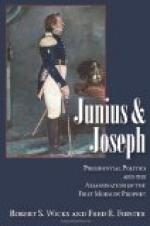Ephraim continued to enlighten the preacher in a stronger tone. “Whether the man is mad or false, almost all the immoralities that you will hear reported about him are, as far as I can make out, not true. He doesn’t teach that it’s unnecessary to obey the ten commandments, or beat his wife, nor is he drunken. He’s got the sense to see that all that sort of thing wouldn’t make a big man of him. It’s merely a revised form of Christianity, with a few silly additions, that he claims to be the prophet of.”
Mrs. Croom began to weep bitterly.
The elder Croom asked a pertinent question. “Why do you wilfully distress your mother, Ephraim?”
“Because, sir, I love my mother too well to sit silent and let her think that injustice can glorify God.”
It was a family jar.
Finney was a man of about forty years of age; his eyes under over-reaching brows were bright and penetrating; his face was shaven, but his mouth had an expression of peculiar strength and gentleness. He looked keenly at the son of the house, who was held to be irreligious. And then he looked upon Susannah, whose beauty and frivolity had not escaped his keen observation. He lived always in the consciousness of an invisible presence; when he felt the arms of Heaven around him, wooing him to prayer, he dared not disobey.
He arose now, setting his chair back against the wall with preoccupied precision. “The spirit of prayer is upon me,” he said; and in a moment he added, “Let us pray.”
Susannah was eating, and with relish. She laid down her bit of pumpkin pie and stared astonished. Then, being a girl of good sense and good feeling, she relinquished the remainder of her supper, and, following her aunt’s example, knelt beside her chair.
The two candles and the firelight left shadowy spaces in parts of the room, and cast grotesque outlines against the walls. Nothing was familiar to Susannah’s eye; she could not help looking about her. Ephraim was nearest to her. He was a bearded man, and seemed to her very old. She saw that his face looked pale and distressed; his eyes were closed, his lips tight set, like one bearing transient pain. At the end of the table her uncle knelt upright, with hands clasped and face uplifted, no feature or muscle moving—a strong figure rapt in devotion. On her other side, as a slight tree waves in the wind, her aunt’s slim figure was swaying and bending with feeling that was now convulsive and now restrained. Sometimes she moaned audibly or whispered “Amen.” Across the richly-spread table Susannah saw the preacher kneeling in a full flickering glare of the pine fire, one hand upon the brick jamb, the other covering his eyes, as if to hide from himself all things that were seen and temporal in order that he might speak face to face with the Eternal.
It was some time before she listened to the words of the prayer. When she heard Ephraim Croom spoken of by name, there was no room in her mind for anything but curiosity. After a while she heard her own name, and curiosity began to subside into awe. After this the preacher brought forward the case of Joseph Smith.




